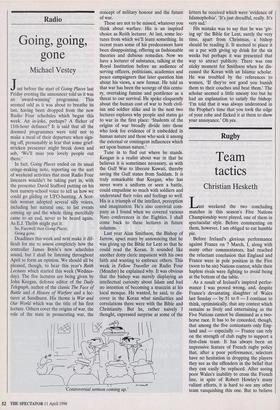Radio
Going, going, gone
Michael Vestey
Just before the start of Going Places last Friday evening the announcer told us it was an 'award-winning' programme. This seemed odd as it was about to breathe its last, having been dropped from the new Radio Four schedules which began this week. An in-joke, perhaps? A flicker of 11th-hour defiance? It is said that all the doomed programmes were told not to make a meal of their departure when sign- ing off, presumably in fear that some grief- stricken presenter might break down and sob, 'We'll miss you lovely people out there.'
In fact, Going Places ended on its usual cringe-making note, reporting on the sort of weekend activities that most Radio Four listeners wouldn't be taking part in, with the presenter David Stafford putting on his best nursery-school voice to tell us how we could go gliding or UFO-hunting. A Scot- tish woman adopted several silly voices, including her natural one, to list events coming up and the whole thing mercifully came to an end, never to be heard again. As E.J. Thribb might put it: So, Farewell then Going Places,
Going gone.
Deadlines this week and next make it dif- ficult for me to assess completely how the controller James Boyle's new schedules sound, but I shall be listening throughout April to form an opinion. We should all be pleased, though, to hear this year's Reith Lectures which started this week (Wednes- day). The five lectures are being given by John Keegan, defence editor of the Daily Telegraph, author of the classic The Face of Battle and A History of Warfare and a lec- turer at Sandhurst. His theme is War and Our World which was the title of his first lecture. Others cover the origins of war, the role of the state in prosecuting war, the concept of military honour and the future of war.
These are not to be missed, whatever you think about warfare. His is an inspired choice as Reith lecturer. At last, some lec- tures from which we'll learn something. In recent years some of his predecessors have been disappointing, offering us fashionable theories and dubious remedies. Now we have a lecturer of substance, talking at the Royal Institution before an audience of serving officers, politicians, academics and peace campaigners that later question him about his views, a new format. He told us that war has been the scourge of this centu- ry, overtaking famine and pestilence as a threat to our survival. He spoke eloquently about the human cost of war to both civil- ian and soldier alike and in the next two lectures explores why people and states go to war in the first place: 'Students of the origins of war broadly divide into those who look for evidence of it embedded in human nature and those who seek it among the external or contingent influences which act upon human nature.'
Tune in to find out where he stands. Keegan is a realist about war in that he believes it is sometimes necessary, as with the Gulf War to liberate Kuwait, thereby saving the Gulf states from Saddam. It is truly remarkable that Keegan, who has never worn a uniform or seen a battle, could empathise so much with soldiers and understand their roles and feelings so well. His is a triumph of the intellect, perception and imagination. He's also convivial com- pany as I found when we covered various Nato conferences in the Eighties. I shall come back to these lectures in future columns.
Last year Alan Smithson, the Bishop of Jarrow, upset many by announcing that he was giving up the Bible for Lent so that he could read the Koran. It sounded like another dotty cleric impatient with his own faith and wanting to embrace others. This week in Fellow Traveller on Radio Four (Monday) he explained why. It was obvious that the bishop was merely displaying an intellectual curiosity about Islam and had no intention of becoming a muezzin at his local mosque. He wanted, he said, to dis- cover in the Koran what similarities and correlations there were with the Bible and Christianity. But he, rather naively I thought, expressed surprise at some of the `Controversial sermon coming up.' letters he received which were 'evidence of Islamophobia'. 'It's just dreadful, really. It's very sad.'
His mistake was to say that he was 'giv- ing up' the Bible for Lent, surely the very time, apart from Christmas, a bishop should be reading it. It seemed to place it on a par with giving up drink for the six weeks but perhaps it was presented that way to attract publicity. There was one sticky moment for Smithson when he dis- cussed the Koran with an Islamic scholar. He was troubled by the references to women, `If they're not good you banish them to their couches and beat them.' The scholar seemed a little uneasy too but he had an explanation to satisfy the bishop: `I'm told that it was always understood in the Prophet's time that you took the edge of your robe and flicked it at them to show your annoyance.' Oh yes.


































































 Previous page
Previous page